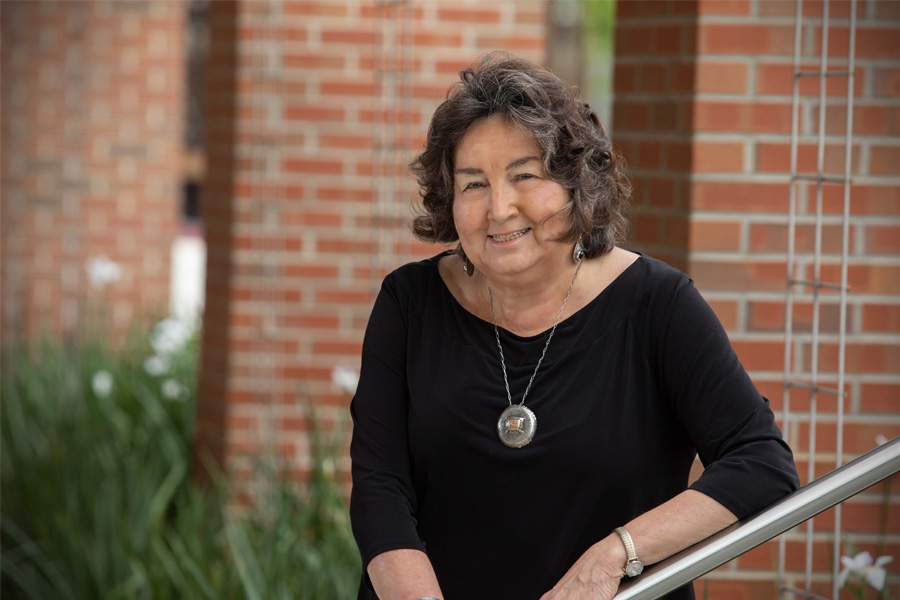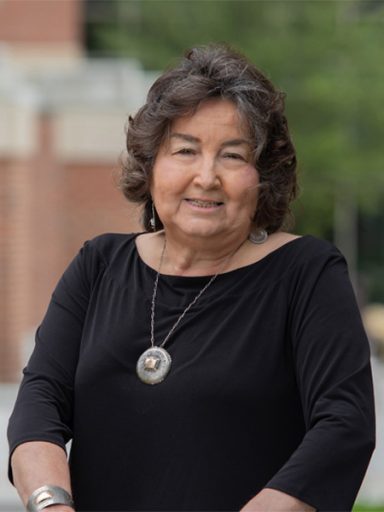
A Florida State University professor whose work has been fundamental in understanding the climate of Africa has been named the university’s 2020-2021 Robert O. Lawton Distinguished Professor.
Sharon Nicholson, a meteorologist with the Department of Earth, Ocean and Atmospheric Science, has been recognized by FSU faculty members with the highest honor they can bestow upon one of their own.
“Sharon Nicholson is an excellent choice for this honor,” said President John Thrasher. “She has an impressive record as a researcher and teacher, and her mentorship has been invaluable to many students. Her work has made a huge impact on the field of climate science, and she exemplifies all the exceptional characteristics of a Lawton Distinguished Professor.”
Nicholson, one of the world’s top climatologists, was thrilled by the recognition.
“I knew I was nominated, but I really never, ever thought it would happen,” Nicholson said. “I was kind of in shock for a few days, still trying to get used to the idea that I am now a Lawton Professor.”
Nicholson’s research focuses on dry climates, particularly in Africa, where she has changed the understanding of drought and rainfall. Her work has debunked previous explanations of the expansion of deserts on the continent.
She also has demonstrated the importance of daily cycles of cloudiness on evaporation of Lake Victoria in east Africa, explained the impact of El Niño on Californian rainfall and modeled air flow in the canyon-like streets of dense cities.

Her work has also been essential in building data sets that have helped other researchers study Africa’s climate. She helped create a 200-year set of precipitation data that combines quantitative measurements with historical evidence.
Before Nicholson’s work, scientists were studying drought in a region known as the Sahel based on just a handful of weather stations. When she finished compiling her data set, it contained information from several hundred weather stations in the Sahel and about 2,000 stations across the continent.
It’s been a massive undertaking and adventure to get that data. She’s made numerous trips, written many letters and translated data from other languages to compile the record. In one case, she was invited to Morocco by the king as a meteorological expert. In another case, she arrived in Mauritania by plane during a coup d’etat. Guards armed with machine guns told passengers they could not deplane, but Nicholson pleaded with them to allow her inside the airport, where she was scheduled to meet someone to collect more weather reports. They did, and she got her data.
“This database formed the foundation of the African data in all major global data sets,” wrote Mark Bourassa, associate director of the Center for Ocean-Atmospheric Prediction Studies at Florida State. “She pioneered the field of historical climatology over Africa, using primarily documentary evidence to reconstruct patterns of rainfall variability during the last few centuries.”
Nicholson’s nomination letters also testified to her work mentoring students.
“[She] has an ability to recognize latent ability in students who apply to graduate school whose qualifications do not jump out at you,” wrote Jon Ahlquist, an associate professor in the Department of Earth, Ocean and Atmospheric Science, who nominated Nicholson for the award. “She then helps those students to grow and excel.”
One such student was Dara Entekhabi, who first met Nicholson when he was a sophomore at Clark University in Worcester, Mass., where she previously taught. Nicholson advocated for Entekhabi to be admitted to graduate school, and he later worked for her as a graduate student. Today, he is a professor of civil and environmental engineering at the Massachusetts Institute of Technology and the lead scientist for NASA’s Soil Moisture Active Passive satellite.
“When I worked in her African Climatology Project, she made the work so interesting and compelling that I changed majors, went to graduate school for its further study, and I am now in an academic position in related subjects,” Entekhabi wrote in a recommendation letter. “To say that she had an influence as an educator and a mentor would be nowhere near a complete description.”
Another student, Ada Monzón, came to Florida State University as a graduate student after Nicholson supported her admission. Monzón went on to become the first female American Meteorological Society Fellow and Certified Broadcast Meteorologist in Puerto Rico. In 2016, Monzón received the society’s Joanne Simpson Mentorship Award for her own mentorship. Later she earned the society’s Award for Broadcast Meteorology for her work on Hurricane Maria.
“One of the things that characterizes my work as a mentor is that I really emphasized diversity,” Nicholson said. “It’s not that I was necessarily planning to do so, it’s just that I’ve been able to recognize talents among women and minorities. I think I’ve been really lucky to have found a number of top-notch students at the master’s level and at the doctoral level.”
Along with this honor, Nicholson has received a Humboldt Research Award and a Fulbright Global Scholar Program Award in 2019, and in 2009, the American Meteorological Society’s Charles E. Anderson Award, an award given for promoting diversity in the atmospheric sciences. At Florida State, she has served as the thesis adviser for more than two dozen master’s and doctoral students.
Nicholson received her bachelor’s, master’s and doctoral degrees from the University of Wisconsin. She was a research associate at the University of Virginia and taught at Clark University before coming to Florida State in 1985.



